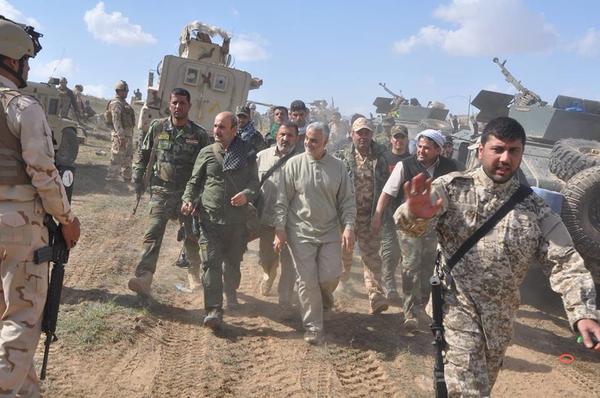Analysis: Iran is no partner in the fight against the Islamic State
Testifying on Capitol Hill on March 3, Joint Chiefs Chairman General Martin Dempsey characterized
the joint attempts of the Iraqi military, Iraqi Shia militias, and
Iran’s Islamic Revolutionary Guards Corps (IRGC) at taking back control
of Tikrit, Saddam Hussein’s hometown, from the Islamic State, as “a
positive thing.” “Frankly,” General Dempsey said, “it will only be a
problem if it results in sectarianism.”
General Dempsey’s caveat is an interesting one, since there is every reason to believe that Shia control of Tikrit will result in further sectarianism. While the US
administration says in its most recent National Security Strategy
that it desires to “degrade and ultimately defeat ISIL [Islamic State]”
in an attempt to “support Iraq … free itself from sectarian conflict
and the scourge of extremists,” Tehran is actively perpetuating the
sectarian crisis in Iraq.
In the past, the Iraqi Shia have
demonstrated little interest in reducing themselves to puppets of
Tehran. During the war with Iraq from 1980-1988, Iraqi nationalism
trumped sectarian identity: the Shia constituted the rank and file of
the Iraqi military, and Shia leaders in Iraq kept their distance from
the regime in Tehran. After the collapse of Saddam Hussein’s regime in
2003, Iraq became a sanctuary to Iranian clerics critical of the regime
in Tehran, including Hossein Khomeini, grandson of the founder of the Islamic Republic.
But Iraq did not remain a refuge for
long. The civil war in Iraq, followed by the rise of Islamic State,
forced moderate Iraqi Shia, who otherwise would have pursued a line
independent of Iran, to become dependencies of Tehran. After being
rebuffed by the US following the Islamic State’s takeover of Mosul in
2014, General Qassem Atta,
head of the Iraqi National Intelligence Service, asked Tehran for help
and received assistance within 48 hours. Iraqi Prime Minister Haider al Abadi
continues to press Washington for more support in his fight against the
Islamic State and uses US hesitancy to justify reliance on Iran, which
according to Vice President Iyad Allawi, only increases Iran’s influence in Iraq and could lead to dismantlement of the Iraqi state.
The Obama administration may desire to
help secure the survival of the Iraqi state, but the small contingent of
US advisers in Iraq is relying on a heavily Iranian-influenced Iraqi
sectarian intelligence and security apparatus. The Iraqi security forces
are predominantly Shia, and in addition, Shia militias and “advisers”
from the IRGC Quds Force are now fighting as legitimate Iraqi forces.
This creates an environment in which
targeting operations developed by Iranian forces and the militias have
primacy over those developed by the US, leading to the possibility that
Washington could be portrayed by Islamic State as complicit in the
indiscriminate targeting of Sunnis. Such operations will be perceived
the same way by the very Sunnis we need to fight Islamic State, thus
undermining the US strategy to “support Iraq … free itself from
sectarian conflict and the scourge of extremists.”
Any US reliance on Iranian support in the
fight against the Islamic State is also likely to strengthen Tehran’s
bargaining position in the nuclear negotiations.
Although both US and Iranian negotiators
maintain that nothing but the nuclear issue is being discussed, this of
course is fiction. On Sept. 22, Fars News, quoting an anonymous American source, reported that Secretary of State John Kerry and Mohammad Javad Zarif, Iran’s foreign minister, discussed the nuclear issue as well as the fight against the Islamic State. And Admiral Ali Shamkhani, Iran’s Supreme National Security Council Secretary, has also connected both issues. Clearly, Tehran’s cooperation with Washington in the fight
against the Islamic State comes at a price, which Washington must pay at
the negotiating table in Geneva.
Iran has Washington where it wants it.
Iran wants a favorable deal, and the Obama administration is signaling
that such a deal is forthcoming. US “strategic patience” is allowing
Iran to increase its influence and presence in Iraq and Syria. Assad is
waiting out the Americans and the international community, and Shia
militias are now viewed as legitimate forces in Iraq, Syria, and Yemen.
But most importantly, US “strategic patience” signals to Iran an
unwillingness to jeopardize the talks by linking them to Iran’s role in
Iraq, Syria, and Yemen.

No comments:
Post a Comment